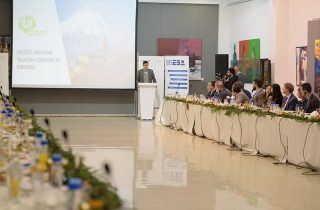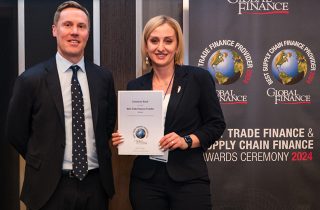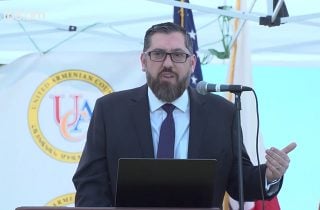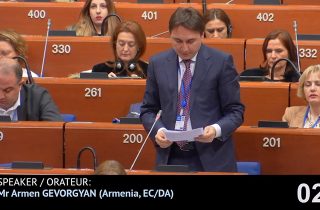“The key question is how the incomes received from mining are managed”
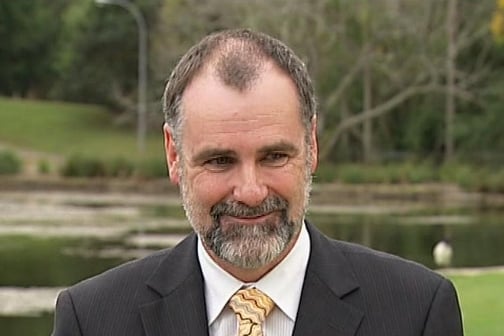
Earlier in the week, during the “Establishment of Accountable Mining – Opportunities and Challenges” international conference taken place in Yerevan, Director of Sustainable Mining Institute, Professor of Queensland University Chris Moraine was among the guests. After the event Moraine answered some of our questions.
-Mr. Moraine, you are also the director of Sustainable Mining Institute. There are opinions that mining and development are contradicting concepts. It means Mining cannot lead to development. What can you say about this?
– I think mining industry is important, very important for the economy. Economic system without mining cannot exist. The question is how it should occur and where, especially the important thing for developing countries is the question of where the money comes from. Not all countries are able to ensure the well being of their populations, feed the work force. So, be careful with such statements. We should be cautious about asserting that the development of this pathway is useless. You can ask the opposite question, if you have natural resources, but they decide to develop, use, how would do you ensure your well being of the population?
-Does it mean that we should offer alternative ways?
– Yes. And people should be told the truth. If your government is honest with the people, tells the truth, then you will not be in the near future be among low-income countries. We sat two hundred meters away from Armani, Versace stores, and none of us would go and buy such products, which are useless. There are questions like how can GDP be changed in the share of mining impacts on the economy. But the main question is, how the mining income is managed. In other words, we bring you the following good management revenues. I think it is clear what we are talking about. Organizations like Transparency International should make the governments pay more attention to this factor. The other side is the extent to which the mining is done at the expense of the environment, the extent of the harm. In this case, attention should be focused on government regulation and make sure the permissions, licenses, are justified. That is a problem not only for income and expenses, but also the environment. Environment should be the center of attention, and to be sure that the environment is preserved.
-In your report you mentioned that for sustainable development it is necessary to reduce the risks of future generations. Who should find these points?
-Yes, you cannot operate at the expense of the future. How to treat is a very difficult question. It can be said whether the 21st century has infinite resources, whether human ingenuity can solve all problems. Unfortunately, we do not have such generosity. In other words, we need to adopt a responsible position, which means that future generations will be able to restore the results of our actions today. They should not be obstacles and problems must not be unsolvable. For example, we can focus resources on the substitution possibilities. Resources are used to replace the resources that have less negative impact. This is a more accurate way of saying that we should not use this copper, because future generations will not be able to recover it. This is a kind of absurd claim. We must use our knowledge, our values and principles for future generations to understand the problems and thinking about progress.
-You are also mentioning that the conflicts have increased between the environment organizations and mining companies. On the other hand, the companies are saying that the standards have been increased.
– This is, in some sense, a paradox, but I will try to explain. It must be viewed from two perspectives. The mining companies and the public companies are doing what they should do, and under pressure from the public, or social influence, more and more attention is focused on environmental norms and steps in this direction. As far as the public is becoming more aware, more in touch with companies especially technological progress, tablet devices that surround us, due to Internet reports much easier. Both companies see opportunities for the public to demand more. In other words, the company develops and does more, so it needs to grow up. This, of course, is not a scientifically valid study but is quite workable in my opinion.
-Your country, Australia, is one of the leading countries in mining. Has Australia in general won having relied on this sector so much?
-To clarify the answer it is a yes. Australia has a developed economy and advanced mining. But it does not have a perfect economy and perfect for mining. There are also some people who are categorically against mining. There are also people who are involved in this case for several generations, and mining. We also have another group of people who are rich enough. But they are not against mining, but believe that it should not be in their city or country, but should move to another place. For example, in Armenia in my opinion this is an unacceptable approach. Australia won back the mining industry. Yes, it won. Australia is a country with a developed economy. We have very good management system, environmental management is a good mechanism for active public involvement. We also have a normal legislation, oversight mechanisms. This is very important because all of this must be based on the company’s value system or spoken words, but there should be clear regulatory mechanisms, specific criteria, standards, rules and regulations. The government is all that is needed in a specific public data, records and other documents so that people can see and understand.
-If political and economic institutes are not developed in a country and if there is no sufficient trust towards the government, can the society expect an accountable mining and management?
– There are many countries that have this problem. However, in this case the word does not refer to the mining industry. It’s a deeper, more complex issue in relation to the values of transparency and other factors. A long time is required for the resolution of these issues. What can be done is to seek to achieve small victories? You cannot go very far in a short time. The trust must be built in a variety of ways to achieve small victories, dialogue, discussion and cooperation. For example, we can start discussing the very same mining taxation mechanisms. If you do not agree with the government, then you can discuss and negotiate various issues. If you don’t see this dialogue then you can change the government through elections. And if you cannot change a bad government, then your problem is more fundamental.
-Can the conference change anything? Can it conduce to accountable mining development?
-I think yes. This is one of the ways of reaching the goals that I brought up. Of course, it would be naïve to think that the conference could have solved the existing problems. This can become the beginning of a long road. So I think the conference will bring positive results.
Interviewed by Babken Tunyan











